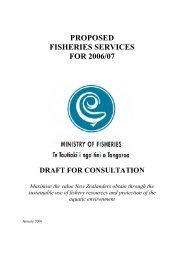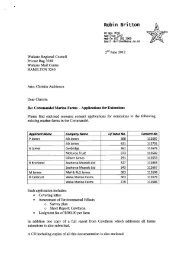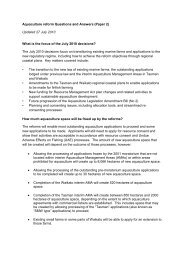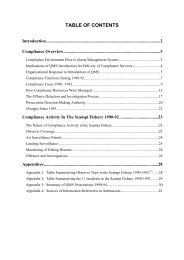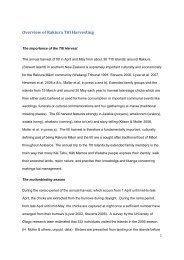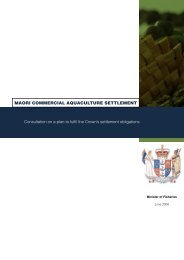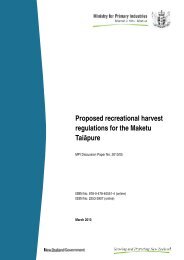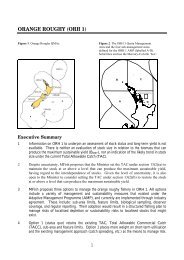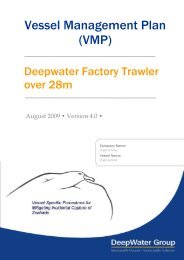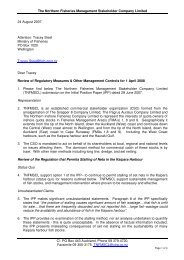AMATEUR ROCK LOBSTER HARVEST REGULATIONS - FINAL ...
AMATEUR ROCK LOBSTER HARVEST REGULATIONS - FINAL ...
AMATEUR ROCK LOBSTER HARVEST REGULATIONS - FINAL ...
You also want an ePaper? Increase the reach of your titles
YUMPU automatically turns print PDFs into web optimized ePapers that Google loves.
number of harvesting pots that are available to them. The regulations have<br />
most impact in the Fiordland Marine Area where reduced pot limits and<br />
accumulation limits apply.<br />
Assessment of option A – status quo<br />
Sustainability and Environment<br />
55 Option A proposes to maintain current rock lobster pot requirements and<br />
would have no impact on rock lobster sustainability.<br />
56 There are no perceived risks or impacts on other marine organisms and the<br />
surrounding environment if current regulations are maintained.<br />
Utilisation Value<br />
57 Counting holding pots against the general rock lobster pot limits would not<br />
change current utilisation opportunities of amateur fishers. However, this<br />
option may unnecessarily restrict the ability of amateur fishers using holding<br />
pots to maximise harvesting potential by reducing the number of harvesting<br />
pots that are available to them.<br />
58 Requiring holding pots to meet escape aperture requirements prevents<br />
amateur fishes from protecting their stored catch against predators, such as<br />
octopus.<br />
59 Maintaining the current regulations will not change the utilisation<br />
opportunities or success of either the customary or commercial fishing<br />
sectors.<br />
Credibility and Acceptance<br />
60 Counting holding pots against the general rock lobster pot limits reduces the<br />
number of catching pots available to amateur fishers that also require holding<br />
pots to store their catch. However, only fishers that may not land their catch<br />
on a daily basis would require holding pots. The extent to which this occurs<br />
in the New Zealand amateur rock lobster fishery is unknown, but is<br />
considered to be low outside of the Fiordland Marine Area.<br />
61 In the Fiordland Marine Area, accumulation limits and holding requirements 2<br />
mean fishers that want to store rock lobster live in holding pots, must keep<br />
their daily catches in separate holding pots, further reducing the number of<br />
active pots they have available.<br />
62 Preventing amateur fishers from effectively protecting their stored catch<br />
against outside predators by requiring holding pots to comply with escape<br />
aperture requirements is viewed by amateur fishers as undesirable. Exposure<br />
to outside predators with current escape aperture requirements could result in<br />
a loss of amateur harvested catch or damage to stored catch. The FMG also<br />
view escape aperture requirements as inconsistent when compared with<br />
commercial holding pot requirements.<br />
2 Fisheries (Southland and Sub-Antarctic Areas Amateur Fishing) Regulations 1991, regulation 7(5).



